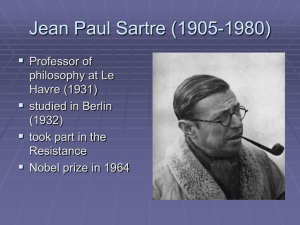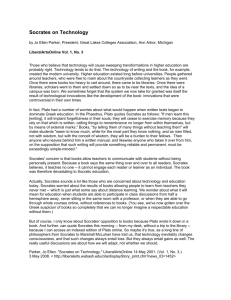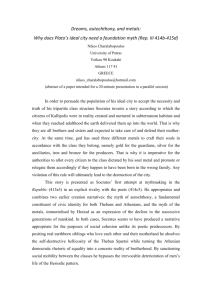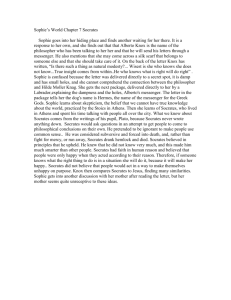socrates-sartre
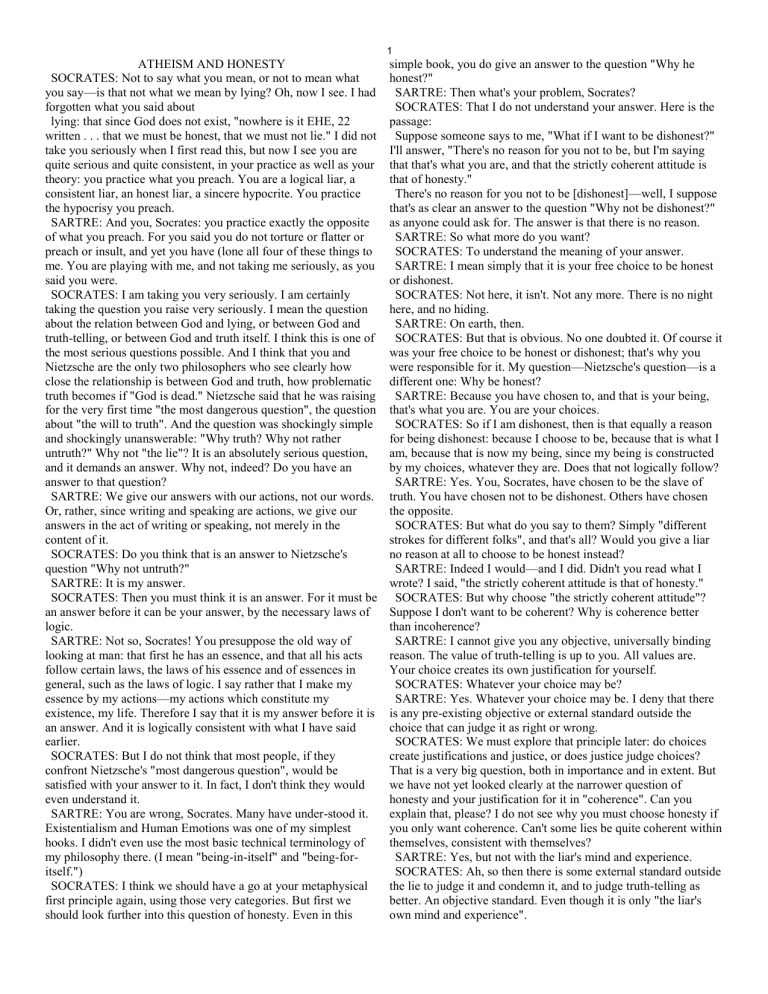
ATHEISM AND HONESTY
SOCRATES: Not to say what you mean, or not to mean what you say—is that not what we mean by lying? Oh, now I see. I had forgotten what you said about lying: that since God does not exist, "nowhere is it EHE, 22 written . . . that we must be honest, that we must not lie." I did not take you seriously when I first read this, but now I see you are quite serious and quite consistent, in your practice as well as your theory: you practice what you preach. You are a logical liar, a consistent liar, an honest liar, a sincere hypocrite. You practice the hypocrisy you preach.
SARTRE: And you, Socrates: you practice exactly the opposite of what you preach. For you said you do not torture or flatter or preach or insult, and yet you have (lone all four of these things to me. You are playing with me, and not taking me seriously, as you said you were.
SOCRATES: I am taking you very seriously. I am certainly taking the question you raise very seriously. I mean the question about the relation between God and lying, or between God and truth-telling, or between God and truth itself. I think this is one of the most serious questions possible. And I think that you and
Nietzsche are the only two philosophers who see clearly how close the relationship is between God and truth, how problematic truth becomes if "God is dead." Nietzsche said that he was raising for the very first time "the most dangerous question", the question about "the will to truth". And the question was shockingly simple and shockingly unanswerable: "Why truth? Why not rather untruth?" Why not "the lie"? It is an absolutely serious question, and it demands an answer. Why not, indeed? Do you have an answer to that question?
SARTRE: We give our answers with our actions, not our words.
Or, rather, since writing and speaking are actions, we give our answers in the act of writing or speaking, not merely in the content of it.
SOCRATES: Do you think that is an answer to Nietzsche's question "Why not untruth?"
SARTRE: It is my answer.
SOCRATES: Then you must think it is an answer. For it must be an answer before it can be your answer, by the necessary laws of logic.
SARTRE: Not so, Socrates! You presuppose the old way of looking at man: that first he has an essence, and that all his acts follow certain laws, the laws of his essence and of essences in general, such as the laws of logic. I say rather that I make my essence by my actions—my actions which constitute my existence, my life. Therefore I say that it is my answer before it is an answer. And it is logically consistent with what I have said earlier.
SOCRATES: But I do not think that most people, if they confront Nietzsche's "most dangerous question", would be satisfied with your answer to it. In fact, I don't think they would even understand it.
SARTRE: You are wrong, Socrates. Many have under-stood it.
Existentialism and Human Emotions was one of my simplest hooks. I didn't even use the most basic technical terminology of my philosophy there. (I mean "being-in-itself" and "being-foritself.")
SOCRATES: I think we should have a go at your metaphysical first principle again, using those very categories. But first we should look further into this question of honesty. Even in this
1 simple book, you do give an answer to the question "Why he honest?"
SARTRE: Then what's your problem, Socrates?
SOCRATES: That I do not understand your answer. Here is the passage:
Suppose someone says to me, "What if I want to be dishonest?"
I'll answer, "There's no reason for you not to be, but I'm saying that that's what you are, and that the strictly coherent attitude is that of honesty."
There's no reason for you not to be [dishonest]—well, I suppose that's as clear an answer to the question "Why not be dishonest?" as anyone could ask for. The answer is that there is no reason.
SARTRE: So what more do you want?
SOCRATES: To understand the meaning of your answer.
SARTRE: I mean simply that it is your free choice to be honest or dishonest.
SOCRATES: Not here, it isn't. Not any more. There is no night here, and no hiding.
SARTRE: On earth, then.
SOCRATES: But that is obvious. No one doubted it. Of course it was your free choice to be honest or dishonest; that's why you were responsible for it. My question—Nietzsche's question—is a different one: Why be honest?
SARTRE: Because you have chosen to, and that is your being, that's what you are. You are your choices.
SOCRATES: So if I am dishonest, then is that equally a reason for being dishonest: because I choose to be, because that is what I am, because that is now my being, since my being is constructed by my choices, whatever they are. Does that not logically follow?
SARTRE: Yes. You, Socrates, have chosen to be the slave of truth. You have chosen not to be dishonest. Others have chosen the opposite.
SOCRATES: But what do you say to them? Simply "different strokes for different folks", and that's all? Would you give a liar no reason at all to choose to be honest instead?
SARTRE: Indeed I would—and I did. Didn't you read what I wrote? I said, "the strictly coherent attitude is that of honesty."
SOCRATES: But why choose "the strictly coherent attitude"?
Suppose I don't want to be coherent? Why is coherence better than incoherence?
SARTRE: I cannot give you any objective, universally binding reason. The value of truth-telling is up to you. All values are.
Your choice creates its own justification for yourself.
SOCRATES: Whatever your choice may be?
SARTRE: Yes. Whatever your choice may be. I deny that there is any pre-existing objective or external standard outside the choice that can judge it as right or wrong.
SOCRATES: We must explore that principle later: do choices create justifications and justice, or does justice judge choices?
That is a very big question, both in importance and in extent. But we have not yet looked clearly at the narrower question of honesty and your justification for it in "coherence". Can you explain that, please? I do not see why you must choose honesty if you only want coherence. Can't some lies be quite coherent within themselves, consistent with themselves?
SARTRE: Yes, but not with the liar's mind and experience.
SOCRATES: Ah, so then there is some external standard outside the lie to judge it and condemn it, and to judge truth-telling as better. An objective standard. Even though it is only "the liar's own mind and experience".
SARTRE: I would not call that "an objective standard". It's not
God, or "natural law", or some Platonic Idea of the Good, or the
Ten Commandments, or anything like that. It's the individual's own mind and experience. I would not call that objective but subjective.
SOCRATES: Is the choice between honesty and dishonesty a choice between opposite values?
SARTRE: Of course.
SOCRATES: And is the choice between coherence and incoherence, between consistency and inconsistency, also a choice between opposite values?
SARTRE: Yes.
SOCRATES: And do you say that all values are subjective?
SARTRE: Yes. That is why I would not impose my personal values on you, or judge yours as objectively wrong, any more than I would judge your taste in cheese, or women.
SOCRATES: Oh, but you do. You do just that. SARTRE: What!
Where?
SOCRATES: Why right here, in this book that you wrote, this book that we are exploring. You say: "I maintain that there is dishonesty if I choose to state that certain values exist prior to me; it is self-contradictory for me to want them and at the same time state that they are imposed on me." That seems pretty
"judgmental" to me.
SARTRE: But that is not my attempt to impose my values on anyone else. The man who surrenders to any values as prior to him, whether the values are mine or God's, is dishonest. And dishonesty is in-consistency. For if these values are imposed on him, then they are not his will, but an other will. And if they are his will, then they are not imposed on him from another.
SOCRATES: I don't see how they can't be both.
SARTRE: How can they be? Haven't you read Kant? Your morality is either heteronomous or autonomous. Your values come either from your own will, freely, or from another's will, unfreely. How could they be both?
SOCRATES: They could be both if you will the will of the other.
SARTRE: Oh. But you can't do that and at the same time remain free. I will not compromise or limit or finitize my freedom.
SOCRATES: But you have already done just that, in saying that we can't do, that we aren't free to do, what most people believe we are free to do, namely to freely will the will of another, to freely choose to agree and believe and conform and obey the will of another, whether that other is man or God. You say we are less free than most people believe, not more; for you say we are not free to say "thy will be done."
But we will explore the question of freedom later. My question now is simply this: You would tell me that honesty is better than dishonesty simply because it is coherent with my own subjective experience—is that right?
SARTRE: Yes.
SOCRATES: And what if I say that it is not more coherent with my subjective experience?
SARTRE: Then for you that's what it is. That is your truth. Truth is subjective. There is no impersonal, objective, universal, unchangeable, absolute a priori Truth for everyone.
SOCRATES: Not even the law of non-contradiction?
SARTRE: Not even that, if I choose to say No to it. And I can.
You see, Socrates, I am like Dostoyevski'.s "Underground Alan" in the Crystal Palace of Reason. I explode the crystal. You say to me that two and two are four, and that is a fact. And I say to you
2 that I hate the fact that two and two are four, and that is also a fact. You say to me that I contradict myself, and I reply that that is precisely my glory. As the American poet, Walt Whitman, wrote, "Do I contradict myself? Very well, then, I contradict myself. I am large. I contain multitudes." You see, Socrates, there stands before you an example of what you say is impossible. I am a man who has chosen to contradict himself if he wills to. It is possible, you see, to choose to he self-contradictory. For if God does not exist, all things are possible as well as permissible. There is no a priori Truth for the same reason there is no a priori Good: because "there is no infinite and perfect consciousness to think it."
"Objective Truth" is just God without a face.
SOCRATES: I see. So atheism is your very first principle, and not deduced from any other, such as the problem of evil, or anything from science.
SARTRE: Yes. We have established that already.
SOCRATES: Let's see whether I have this right or not. I think I have discovered the chain of your logic. You reject objective values. And when asked why, you say because you think it is
"dishonest" to accept them. And when asked why you reject dishonesty, you say that "the strictly coherent attitude is that of honesty". And when asked why you reject incoherence, you say that there is no reason for coherency, because there is no God, no eternal Truth or eternal Being, and therefore no metaphysical basis for the law of non-contradiction.
SARTRE: I affirm that chain of reasoning.
SOCRATES: So we have tracked the chain back to its first link, the absence of God.
SARTRE: We have. But that "tracking" is no great achievement.
I said just that, explicitly, in many places.
For instance, "Existentialism is nothing else than an attempt to draw all the consequences of a coherent atheist position." There's my one-sentence summary of existentialism. It took no clever piece of logical detective work on your part to discover what I had already given you. What's your point?
SOCRATES: I just wanted to be totally clear and certain about that point before questioning it.
SARTRE: And what is your question about it now?
SOCRATES: It's just one little word in that wonderful onesentence summary of Existentialism.
SARTRE: What word?
SOCRATES: "Consequences." It seems quite out of place. It assumes the principles of logic, and the law of non-contradiction, which you just rejected along with God.
SARTRE: Not at all. It fits perfectly. I embrace all the logical consequences of atheism, unlike the Enlightenment philosophes.
SOCRATES: But why? Why obey the law of non-contradiction?
Why not be inconsistent?
SARTRE: We are arguing in a circle. You asked that before.
SOCRATES: And your answer then was that you could give no answer, no reason for being consistent.
SARTRE: Yes, and I still say that.
SOCRATES: But then you gave a reason for giving no reason, namely that God does not exist and there-fore truth also does not exist—at least a priori truth, unchangeable truth, objective truth, universal truth. For there is no divine mind for these truths to be in.
SARTRE: That's right. I trace all my philosophy back to the absence of God, just as a theist traces all his philosophy back to
God. So we are left with these two fundamental options, each
quite consistent with itself and inconsistent with each other, like two different universes.
SOCRATES: And only one of these mental universes contains a
God, or is the creation of a God, and there-fore only one of them contains all the consequences of there being a God, such as objective truths and objective values.
SARTRE: That's right.
SOCRATES: And one of these consequences is the law of noncontradiction as a universal and objectively binding law over man's mind.
SARTRE: Correct again.
SOCRATES: Let me see whether I have your position clear in my own mind or not. Here you stand, an atheist. And here stands a theist before you. And each of us makes a choice, an opposite choice: God or no God. And each of us is responsible for that choice, and for all the consequences of that choice. Correct so far?
SARTRE: Yes.
SOCRATES: And one of the consequences of your atheistic choice is that there are no objective truths, and no objective values, and no human nature, and that existence is prior to essence.
SARTRE: We have gone over all that before. You are getting very tiresome, Socrates. What is your question?
SOCRATES: It is this: Why do you as an atheist treat one of the features you claim is valid only in the theistic universe as if it were equally valid in your atheistic universe? In fact, you treat it as if it were valid above or outside of both universes, as a standard for judging them and comparing them.
SARTRE: But I don't believe in any universal truth overarching all universes. That's my point. That's a consequence of atheism.
SOCRATES: I see. These other atheists, the rationalists of the
Enlightenment, the philosophes, they did not realize this consequence, as you did, did they?
SARTRE: No, they didn't. SOCRATES: Why didn't they?
SARTRE: They were not consistent. They did not follow out their atheism into all the logical consequences, as I did.
SOCRATES: So you are using the standard of logical consistency, the laws of logic, which you claim have absolute validity only within the theistic universe—you are using this
"God without a face" to judge and condemn these philosophes as inconsistent and to justify yourself as consistent. And you are also using it as a standard to compare the atheistic universe and the theistic universe when you criticize the theist for being
"inconsistent" when he claims that he freely chooses objective values and at the same time claims they are imposed on him by
God.
SARTRE: Ah, I see what you are doing, Socrates: you are playing Cratylus to my Heraclitus.
SOCRATES: I think I know what you mean by that, but would you please spell it out for me?
SARTRE: Heraclitus taught that "everything flows", like a river; that there was no unchanging reality and therefore no unchanging truth except the law or "logos" of change itself. He said, "You can never step into the same river twice, for other and yet other waters are always flowing on." And his disciple Cratylus accused his teacher Heraclitus of inconsistency, both in theory and in practice.
In theory, for Cratylus said that if Heraclitus is right, you couldn't even step into the same river once. And in practice, because if every-thing changes, then the meaning of speech and perhaps
3 even the laws of thought change too (for speech is a kind of river). So Cratylus would not speak a word, hut only move his little finger.
And now, it seems, you are trying to silence me by arguing that my very act of arguing, or speaking coherently and consistently, presupposes your God —with or without a face. So I am being inconsistent with my atheism even by speaking in a coherent way.
SOCRATES: That is exactly my question. Thank you for formulating it so clearly.
SARTRE: You're welcome.
SOCRATES: And your answer to it is—?
SARTRE: I am surprised you do not see it, Socrates. It's very obvious. You have accused me of inconsistency, and I answer:
Guilty as charged! But in my court, what you call a crime is a heroic deed. My answer is Walt Whitman's answer. Of course I contradict myself Whenever I want to! That is the privilege of an atheist, a privilege you sheepish theists have refused to accept.
You freely sell your birthright of freedom and bow down to the tyranny of the laws of logic, laws which you have decreed yourself. You are the idolaters, not we atheists; you worship your own inventions, your own idols. We do not.
SOCRATES: How fascinating: the accusation of idolatry from an atheist! On earth, I was accused of atheism by idolaters. A double irony.
SARTRE: Is that the best you can do, Socrates? An ad hominem ?
SOCRATES: That is not my answer. SARTRE: Well? I'm waiting.
SOCRATES: Imagine a very primitive country that neither makes nor imports nor uses any kind of money. Now tell me: with no real money, how could any coin be counterfeit in that country?
SARTRE: It couldn't, of course.
SOCRATES: And counterfeit money is to real money as idols are to God?
SARTRE: The analogy seems apt.
SOCRATES: And an atheistic universe, without any God or gods at all, is like a country without any money at all. Is that a fair analogy?
SARTRE: I suppose so.
SOCRATES: Then tell me, how could I possibly commit idolatry in your atheistic universe? How can one sin against a
God who does not exist?
SARTRE: One cannot, of course. But in your universe there is a
God. So you can commit idolatry.
SOCRATES: But if there is a God, it is not idolatry to believe in objective truth and the laws of coherence and non-contradiction, for they stem from the divine nature.
SARTRE: SO what?
SOCRATES: So whether there is or is not a God, in neither case can the believer in objective truth be committing idolatry.
SARTRE: Hmmm. . . .
SOCRATES: But we have again been diverted onto a long side road, though an important one. We should have been examining your book more closely.

